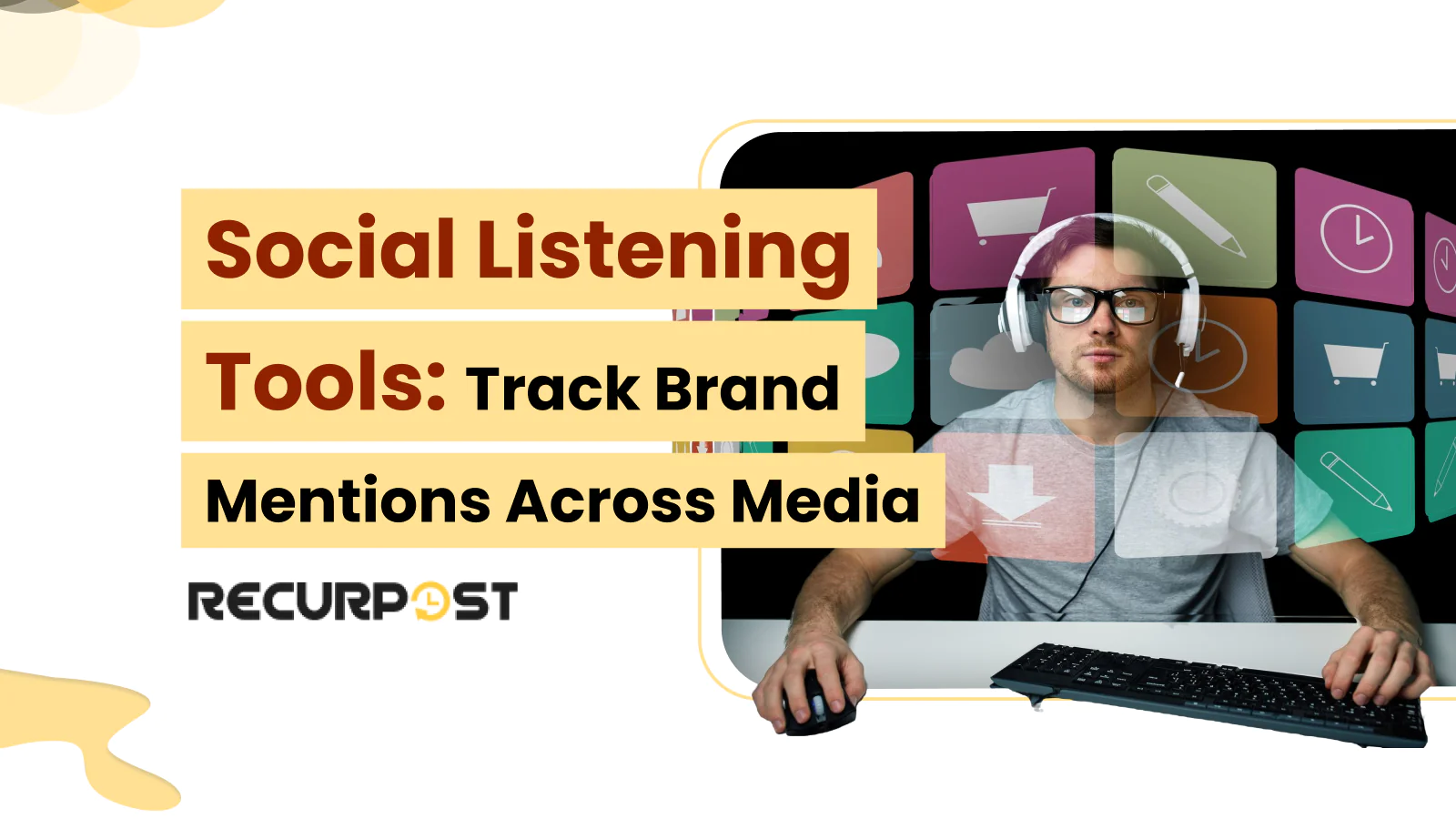If you’re a social media manager or marketer, staying aware of what people say about your brand is critical. Social listening tools track online conversations across social media and the web so you never miss a mention. These platforms let you monitor conversations, track brand mentions, and measure public sentiment in real time. With the right setup, you gain insights that shape your social media presence, strengthen engagement, and protect your brand reputation across major networks.
But with so many choices on the market, how do you pick the right fit for your social media marketing team?
In this post, we’ll cover the top 10 social listening tools worth considering in 2025. These platforms give you the power to track industry trends, monitor competitors, and measure campaign impact. You’ll also see the main features to compare when choosing the best social media tracking tools for your business.
Essential Features for the Best Social Listening Tools
When choosing the best social listening tools, focus on the features that bring real value to your social media monitoring. The right setup lets you track trends, manage brand reputation, and follow competitor activity with ease.
1. Sentiment Analysis
Strong social listening tools detect tone behind mentions of your brand or products. They classify posts as positive, negative, or neutral. This sentiment analysis helps you gauge public opinion, spot issues before they grow, and adjust your response quickly.
2. Trend and Crisis Monitoring
Top tools include alerts for industry trends or sudden PR issues. Notifications arrive the moment your brand is mentioned online. If a launch gets negative feedback in conversations, quick action keeps customers engaged and limits damage.
3. Influencer Identification
Influencers shape brand reputation and reach. Social listening platforms help you find key voices in your niche, track their posts, and engage with them to grow your audience.
4. Competitive Analysis
Social media tracking tools compare your brand against rivals. Watching competitor activity and audience reactions helps you adapt and keep an edge.
5. Real-Time Alerts
The best social listening tools deliver instant alerts for brand mentions and trending topics. Quick responses keep your brand relevant and in the conversation.
6. Analytics and Reporting
Look for tools with clear dashboards, exportable reports, and simple visual charts. These features turn raw data into useful insights you can share with your team or clients.
7. Multi-Channel Listening
Great platforms go beyond Facebook or Instagram. Tools like RecurPost extend coverage to blogs, forums, YouTube, and review sites, giving you a broad view of your brand presence.
8. Real-Time Monitoring at Scale
Conversations move fast. The best tools track mentions the moment they happen. Whether praise, complaints, or trending opportunities, real-time monitoring lets you respond quickly and stay ahead.
How to Choose the Right Tool for Your Needs
- Business size: Small teams need affordable options, while agencies may need advanced features.
- Pricing and growth: The platform should fit your budget and scale with you.
- Integration: Pick tools that connect smoothly with CRM and analytics systems.
- Goals: Your choice depends on whether you want to track mentions, follow sentiment, or monitor competitors.
Why Every Brand Needs a Social Listening Tool: Key Benefits for Business Growth
With conversations moving fast across social media, brands must stay tuned to what their audience is saying. A social listening tool lets you track mentions, measure sentiment, and engage with people in real time. This makes it a vital part of building brand presence and driving business growth.
The benefits of social listening tools include protecting your brand reputation, spotting trends early, and keeping pace with competitors. By watching social media mentions, you gain insights into customer needs and expectations. These insights guide smarter campaigns, stronger engagement, and long-term trust.
Here’s why your brand needs it:
- Know Your Audience: Social listening shows what customers discuss, their likes, and pain points. Sentiment analysis points your team toward content and products that meet real needs.
- Stay Competitive: Tracking competitor mentions reveals strengths and gaps. These insights shape your next moves and position your brand effectively.
- Protect Brand Reputation: Social listening tools catch negative feedback early, allowing quick action before issues spread. Fast response builds loyalty and trust.
- Spot New Trends: Watching industry chatter highlights rising topics. Acting early keeps your brand relevant and visible.
- Strengthen Customer Service: Fast replies to complaints or praise turn conversations into positive experiences. Social media listening tools make these interactions smoother.
- Track Campaign Impact: Clear reports measure reach, engagement, and sentiment. This feedback fine-tunes campaigns for stronger results.
- Drive Growth: Social listening highlights market gaps, sparks new product ideas, and opens growth opportunities.
Free Social Listening Tools: Get Started Without Spending
You don’t need a large budget to begin tracking your audience. If you’re testing options or working lean, these free social listening tools cover the basics for monitoring your brand online.
1. Google Alerts
Google Alerts scans blogs, news sites, and web pages, then emails you when chosen terms appear.
Best for: Simple web-based brand monitoring.
2. X Pro (formerly TweetDeck)
TweetDeck is built for real-time Twitter activity. It lets you follow hashtags, mentions, and keywords with customizable columns.
Best for: Live Twitter tracking and quick engagement.
3. Social Searcher
This freemium tool scans several social media platforms and includes basic sentiment analysis. Social Searcher is useful for capturing multi-platform snapshots at a glance.
Best for: Real-time social media monitoring across networks.
When to Upgrade to Paid Tools
Free options are a solid entry point, but most businesses outgrow them as their needs expand. That’s when paid social listening tools become valuable. Consider upgrading to a platform like RecurPost when you need:
- Wide platform coverage across more channels than free tools support
- Advanced analytics for sentiment tracking and engagement metrics
- Automated reporting that saves time and delivers clear insights
- Team collaboration features for smooth social media management
- Integrated publishing and listening in one place
Paid social media listening tools give brands the scale, accuracy, and flexibility needed to stay ahead in 2025.
10 Popular Social Listening Tools
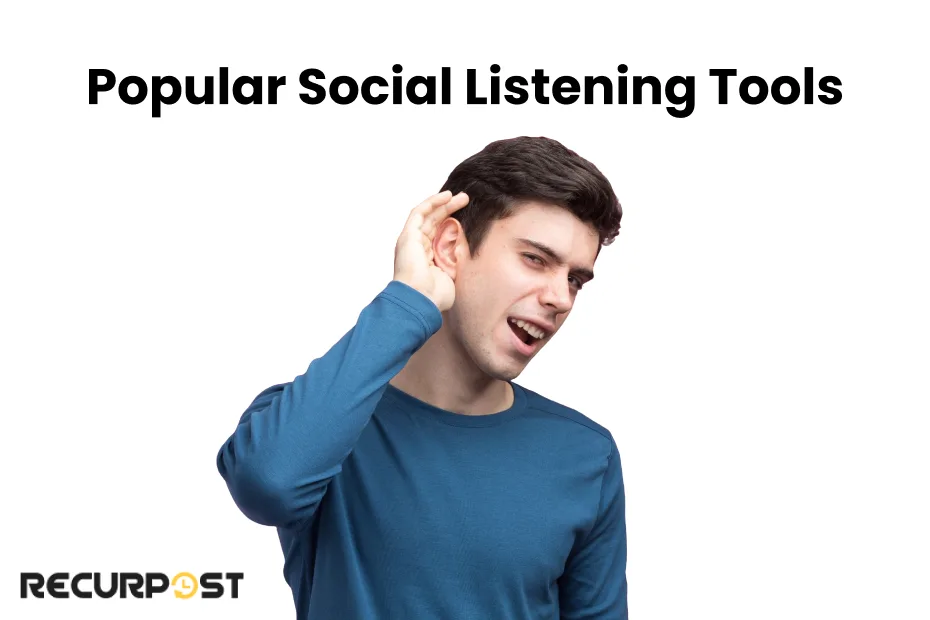
Brands and agencies tracking social media conversations, sentiment, and brand mentions need the right social listening tools. These social media monitoring platforms help you follow trends, gather customer feedback, and watch competitors.
Here are 10 of the most useful social media monitoring tools to consider.
1. Brand24
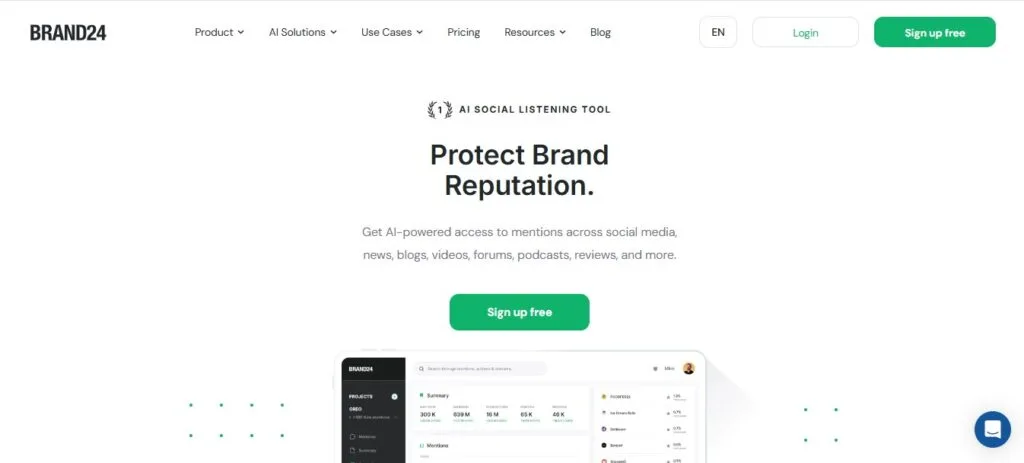
Brand24 tracks brand, product, and competitor mentions across social media, blogs, news sites, and forums with a clean, user-friendly setup. It suits small to mid-sized businesses needing real-time monitoring and historical data for brand reputation management.
Best Feature: Real-time mentions and instant alerts.
Pros:
- Ease of use: Simple dashboard that makes it easy to follow mentions and interact with users
- Affordable: A budget-friendly option for small and growing teams
- Real-time alerts: Instant notifications when your brand is mentioned online
- Sentiment analysis: Tracks whether mentions are positive, negative, or neutral to show public perception trends
Cons:
- Basic reporting: Data is useful, but lacks advanced reporting depth
- Fewer enterprise features: Limited customization compared to larger social media monitoring tools
2. Meltwater
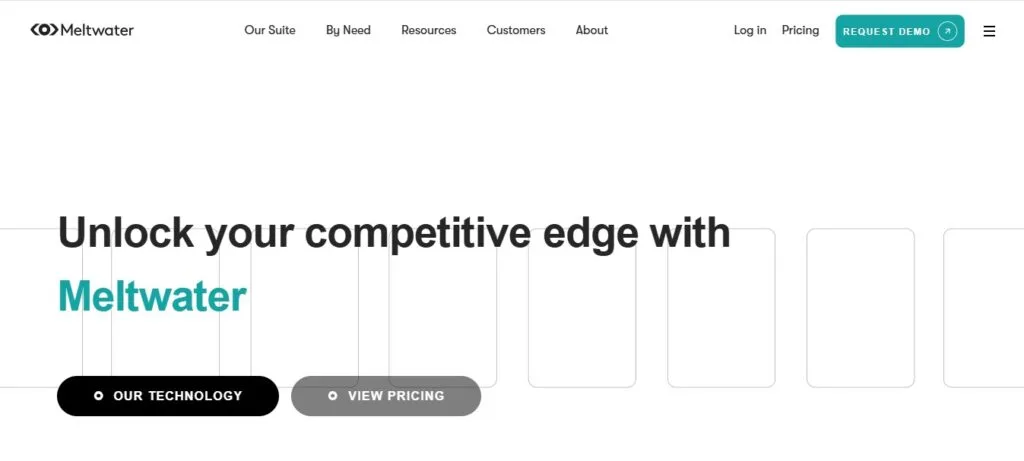
Meltwater is an enterprise-level social listening platform built for global organizations. It tracks brand mentions and delivers broad media intelligence across markets. With advanced analytics, it measures sentiment, media reach, and campaign impact. Best for large enterprises and PR teams that need worldwide coverage and detailed reporting.
Best Feature: Advanced analytics for multi-channel reporting and sentiment tracking.
Pros:
- Global coverage: Pulls insights from news outlets, blogs, and social media in multiple languages
- Custom reports: Tailor reporting to focus on the data points that matter most
- Media intelligence: Tracks campaign performance and press coverage, making it strong for PR teams
- Influencer tracking: Spot influencers and measure their impact on your brand
Cons:
- High cost: Premium pricing makes it better suited for large organizations
- Steeper learning curve: A wide feature set can feel overwhelming for new users
3. Hootsuite Insights
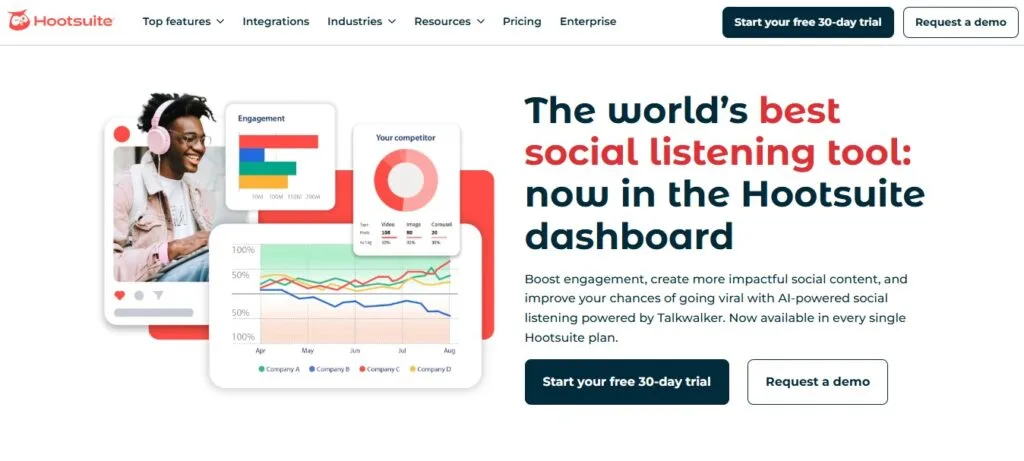
Powered by Brandwatch, Hootsuite Insights integrates social listening tools directly into the Hootsuite dashboard. Users can track brand mentions, monitor sentiment, and follow conversations without switching platforms. This makes it a strong pick for agencies and brands managing multiple accounts across channels. It includes advanced reporting, trend tracking, and real-time social media monitoring.
Best Feature: Built-in integration with Hootsuite for seamless management and listening in one platform.
Pros:
- Unified platform: Combines publishing and listening, convenient for teams already using Hootsuite
- Sentiment and trend tracking: Shows audience mood and surfaces rising topics
- Real-time feeds: Monitor live conversations and mentions as they happen
- Analytics and reports: Visual dashboards highlight audience behaviors and campaign impact
Cons:
- Higher price: May be out of reach for small businesses or startups
- Best for larger teams: Smaller teams may find the platform more than they need
4. Sprinklr
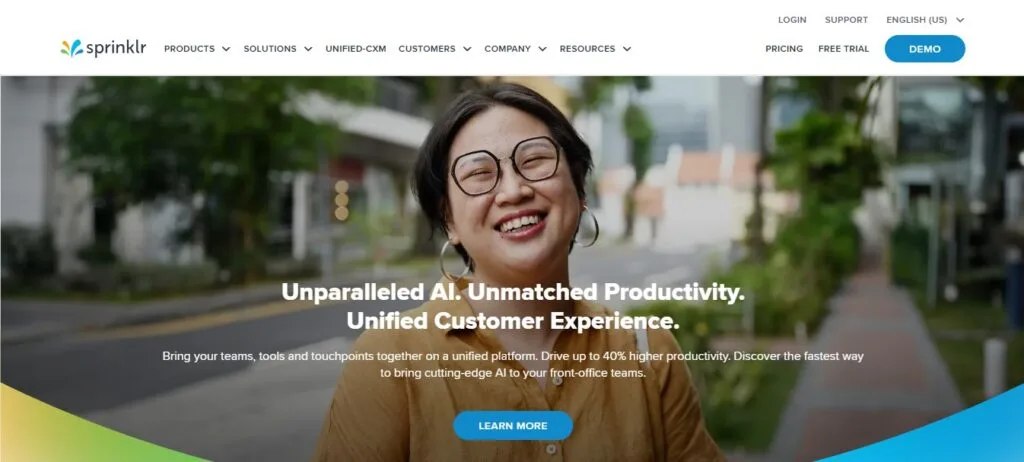
Sprinklr brings social listening into its larger social media management platform. It’s designed for big brands and agencies that need multi-channel coverage, real-time feedback tracking, and customer care tools. The platform monitors brand mentions, sentiment, and campaign performance across multiple social media platforms.
Best Feature: Wide coverage that blends social listening with customer engagement and publishing in one platform.
Pros:
- Multi-channel listening: Track conversations across social media, blogs, news, and other online sources
- Customer care integration: Combines listening with service features to build stronger loyalty
- Analytics: Offers detailed dashboards to measure sentiment and spot trends
- AI-powered insights: Uses AI to surface new topics and track sentiment at scale
Cons:
- Setup time: Can take longer to implement and train teams
- High cost: Pricing is aimed at large organizations, not smaller businesses
5. Mention
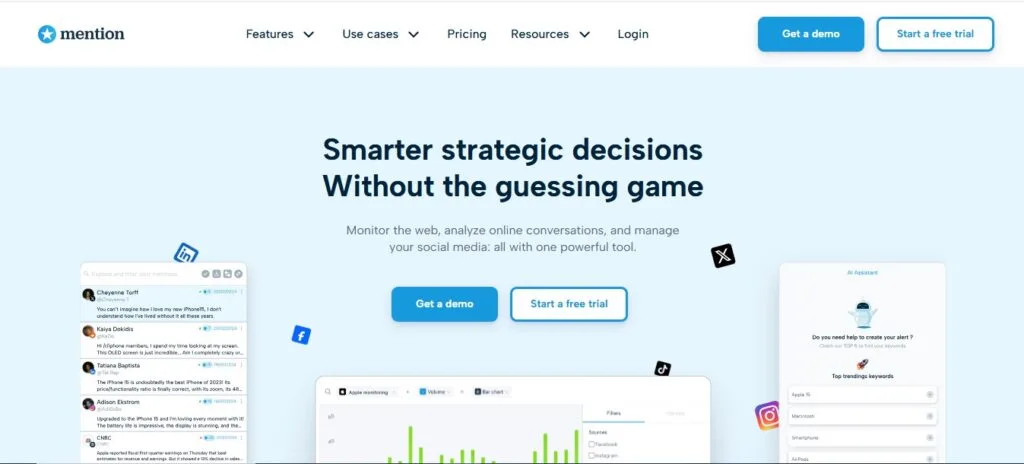
Mention tracks brand mentions across social media platforms, blogs, and news outlets in real time. Small businesses and startups like it for its simplicity and lower cost.
Best Feature: Quick, real-time tracking with instant notifications.
Pros:
- Affordable: One of the most budget-friendly tools on the market
- Real-time alerts: Immediate notifications when your brand is mentioned
- Easy setup: Simple to use, even for beginners
- Sentiment analysis: Tracks mentions along with audience tone
Cons:
- Limited analytics: Fewer reporting options compared to enterprise platforms
- Narrower listening scope: Doesn’t capture as much data as large-scale tools like Meltwater or Brandwatch
6. Talkwalker
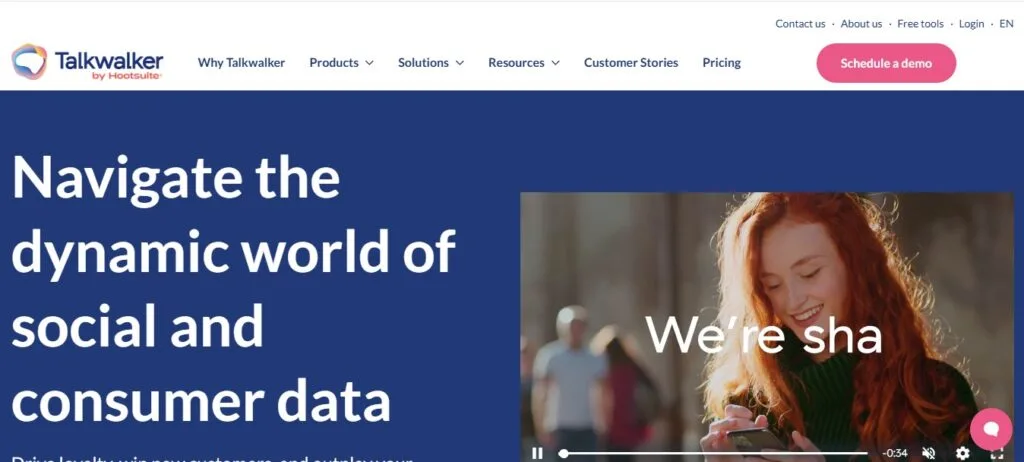
Talkwalker uses AI-driven analytics for brand mention tracking, sentiment measurement, and trend monitoring across social media, blogs, news, and even offline conversations. Companies that need broad insights and reliable coverage often choose this tool.
Best Feature: AI-powered trend detection combined with sentiment tracking.
Pros:
- AI insights: Uses artificial intelligence to track new trends and consumer behavior
- Visual listening: Detects brand logos and other visual content in images and videos
- Analytics: Delivers reports on sentiment, campaign reach, and trend movement
- Global reach: Pulls insights from worldwide sources, including forums and multi-language content
Cons:
- Setup: Can take time to configure for first-time users
- Pricing: Higher cost makes it best for large companies, not small teams
7. Brandwatch
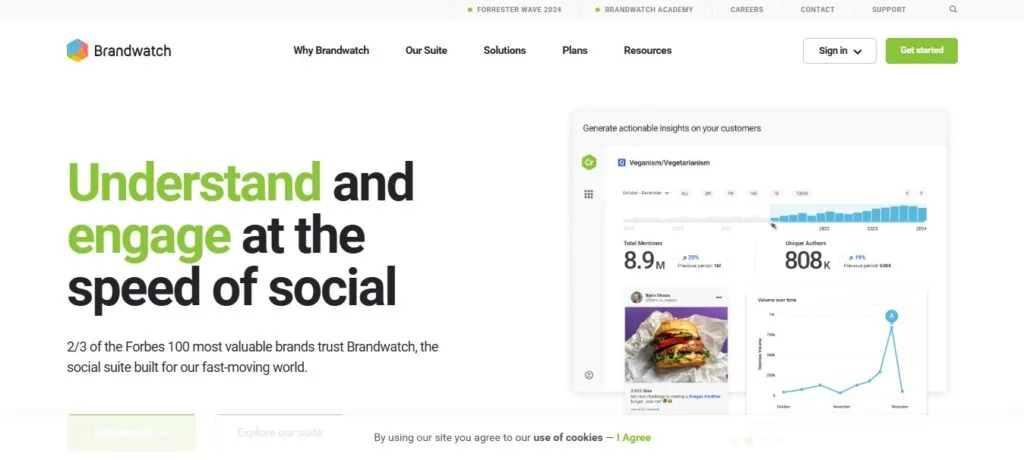
Brandwatch tracks social media mentions and industry trends for brands, agencies, and marketers. Data-focused companies use this platform to follow customer behavior, competitor activity, and overall sentiment across channels.
Best Feature: Custom reporting with flexible dashboards for trend and sentiment tracking.
Pros:
- Detailed reporting: Breaks down customer sentiment, trends, and competitor actions
- Custom dashboards: Create tailored reports that match your brand’s needs
- Competitor tracking: Monitor rival activity and audience reactions
- Wide coverage: Includes social media platforms, blogs, and news sites
Cons:
- High pricing: Often better suited for larger teams than small businesses
- Learning curve: Requires time to get comfortable for first-time users
8. BuzzSumo
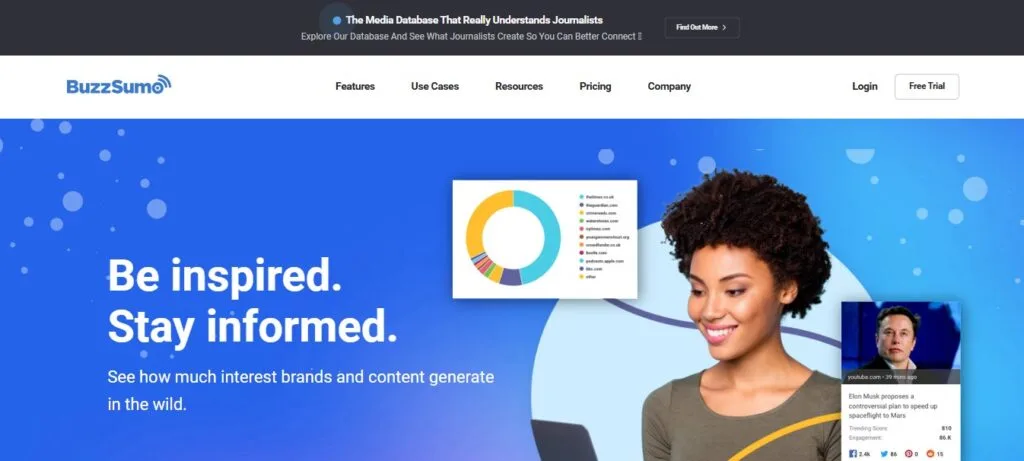
BuzzSumo tracks brand mentions, content reach, and influencer activity across social media and the web. It’s popular with content marketers and agencies who want to measure how well posts perform and find influential voices.
Best Feature: Content performance tracking with influencer discovery.
Pros:
- Content tracking: Measures how content performs across social media platforms
- Influencer discovery: Identifies voices talking about your brand or industry
- Ease of use: Simple interface that’s quick to set up
Cons:
- Limited listening features: Not as broad as enterprise tools like Meltwater or Talkwalker
- More content-focused: Strong for content and influencer tracking, but lighter on full social media monitoring
9. Digimind
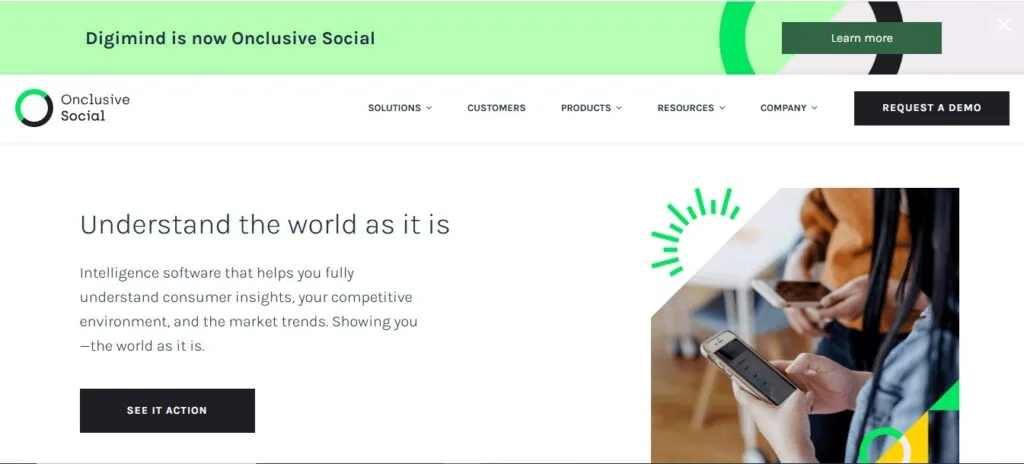
Digimind tracks social media conversations, news, blogs, and forums worldwide. Companies choose it for real-time monitoring, sentiment analysis, and competitor tracking with global reach.
Best Feature: Broad monitoring and sentiment tracking across multiple channels.
Pros:
- Global coverage: Monitors social media and online conversations from around the world
- Sentiment analysis: Measures how audiences feel about your brand
- Custom dashboards: Let you build views around the data most relevant to your team
Cons:
- Learning curve: It can be tricky for new users to navigate
- High pricing: Better suited for large organizations than small businesses
10. Keyhole

Keyhole tracks and monitors social media data in real time. Businesses use it to follow hashtags, keywords, and mentions, gaining insights into sentiment and campaign performance.
Best Feature: Real-time social media monitoring with hashtag tracking.
Pros:
- Live tracking: Instant updates on hashtags, keywords, and brand mentions
- Easy interface: Simple dashboard that’s quick to navigate
- Influencer tracking: Finds voices engaging with your brand
- Analytics: Reports on sentiment, engagement, and campaign reach
Cons:
- Limited coverage: Strong for Twitter and Instagram, but less reach compared to larger tools
- Pricing: A Higher cost may not suit small businesses
What About Enterprise Needs?
Enterprise-grade social listening tools like Meltwater and Sprinklr are designed for large teams with high data requirements. They deliver wide coverage and advanced features but often come with premium pricing.
For agencies or brand managers who want strong social media listening without the heavy cost, RecurPost provides a balance of features and affordability. It combines monitoring, publishing, and reporting in one platform, making it a practical option for growing businesses.
Conclusion
There’s no single best fit when it comes to social listening tools. The right platform depends on whether you need sentiment tracking, competitor monitoring, or social media mentions at scale. By using social media monitoring tools and measurement tools, businesses can track trends, boost engagement, and respond quickly to challenges. These platforms also reveal competitor activity, giving brands an edge. The key is selecting tools that match your goals and budget. With the right choice, you turn social listening into a steady driver of growth and customer trust.
Frequently Asked Questions
1. Can social listening tools help track customer feedback?
Yes. Social listening tools capture customer feedback across social media platforms by monitoring mentions, comments, and reviews. They show audience sentiment and satisfaction, enabling quick action on praise or complaints.
2. Are social listening tools helpful for crisis management?
Absolutely. During PR issues or negative publicity, social listening tools flag negative mentions in real time. Tracking brand mentions and sentiment helps businesses act quickly and protect their reputation.
3. How do social listening tools track online discussions beyond social media?
While many focus on social media, platforms like Talkwalker and Meltwater also scan news outlets, blogs, and forums. This wider monitoring captures conversations happening off traditional platforms.
4. Can social listening tools help with content planning?
Yes. Social listening tools show which content connects with your audience by tracking trending topics, popular keywords, and formats that drive engagement.
5. How do social listening tools work with images and videos?
Some social listening platforms include AI-driven image and video recognition. For example, Talkwalker detects branded logos in images and videos, while others track visual mentions across the web.
6. How accurate is competitor monitoring in social listening tools?
Accuracy varies by platform. Social listening tools highlight competitor mentions and audience sentiment, but human review is often needed for nuanced discussions.
7. Can social listening tools be used for market research?
Yes. They reveal customer behavior, market gaps, and trending topics. Social listening tools capture real-time feedback and highlight needs that guide product development and marketing.
8. Are there free social listening tools available?
Yes. Popular free social listening tools include Google Alerts, TweetDeck, Social Mention, and Hootsuite’s free plan. These cover basics but often lack sentiment tracking, competitor monitoring, or global reach found in paid tools like Brandwatch or Talkwalker.
9. How do social listening tools impact SEO?
Social listening tools support SEO by showing which keywords spark attention on social media, highlighting audience interests, and tracking campaign reach. Aligning content with these topics can improve visibility in search results.
10. Do social listening tools include historical data?
Yes. Platforms like Brandwatch and Meltwater provide historical data access. This allows long-term tracking of sentiment, brand perception, and customer behavior changes.

Ruchi Dhimar is a skilled content writer with 4 years of experience. She is passionate about crafting compelling narratives, specializing in writing content for different industries.
